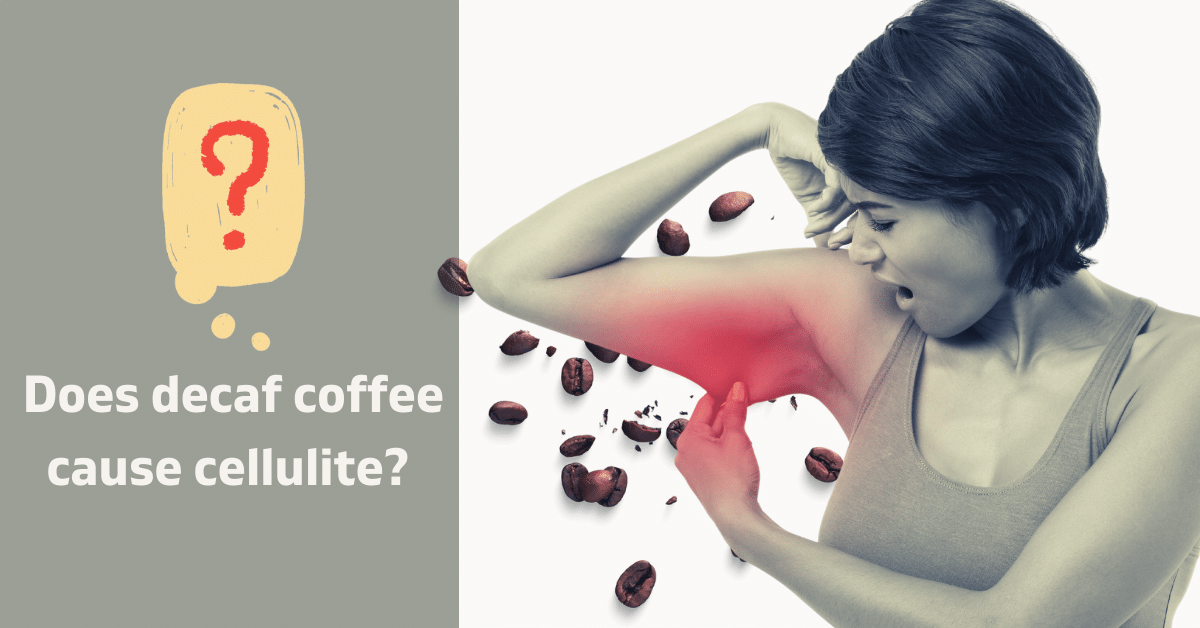If you love coffee and are on a diet or trying to avoid caffeine. In that case, you may wonder if decaf coffee has the same effect on your body as regular coffee. Does decaf coffee cause cellulite? The short answer is no, and there is no scientific evidence to suggest that decaf coffee impacts cellulite.
However, that doesn’t mean that decaf coffee is entirely harmless.
Quick navigation
- Cellulite: the potential causes
- The link between caffeine and cellulite
- Decaf coffee and cellulite – the pros and cons
- Does decaf coffee cause cellulite?
- Other factors that contribute to cellulite
- How to reduce the appearance of cellulite
- Conclusion
Cellulite: the potential causes
Cellulite is a condition that affects many women and is characterized by the appearance of lumpy, dimpled skin. There is no definitive cause of cellulite, but it is believed to be related to genetics, hormones, diet, and exercise. Some people also believe that caffeine can contribute to the development of cellulite.
The link between caffeine and cellulite
Caffeine is a stimulant in many foods and drinks, including coffee, tea, and chocolate. It is also a common ingredient in many over-the-counter medications and supplements.
For years, caffeine has been hailed as a miracle ingredient for cellulite. The theory goes that by increasing blood flow and circulation, caffeine can help to break down the fat cells that cause cellulite. Unfortunately, the reality is not quite so simple. While caffeine may help reduce cellulite’s appearance, no scientific evidence suggests that it has any lasting effects.
Some studies have even shown that caffeine can worsen cellulite by dehydrating the skin, which can, in turn, contribute to the appearance of cellulite. Also, caffeine is thought to contribute to the development of cellulite by increasing insulin resistance and fat storage.
The connection between caffeine and cellulite is thought to be because caffeine dehydrates the skin, making it more vulnerable to dimpling. In addition, caffeine consumption can increase inflammation throughout the body, leading to cellulite formation. So, cutting back on caffeine might be an excellent place to start if you’re looking for ways to reduce your cellulite.
Decaf coffee and cellulite – the pros and cons
Decaf coffee is coffee with most of its caffeine content removed. While it still contains some caffeine, it is much lower than regular coffee. Some people believe drinking decaf coffee can help prevent cellulite, as it may reduce the amount of caffeine the body receives. As caffeine is said to be one of the leading causes.
Others say that there is no concrete evidence to support this claim and that other factors such as diet and exercise are more critical for cellulite.
So, what is the verdict? There is no definitive answer, and it depends on who you ask. However, if you are concerned about cellulite and want to try drinking decaf coffee as prevention, it certainly can’t hurt! Just be sure to maintain a healthy lifestyle, as this is the best way to reduce your risk of developing cellulite.
Read also: Can decaf coffee help you lose weight?
Does decaf coffee cause cellulite?
The short answer is no. There is no scientific evidence to suggest that decaf coffee impacts cellulite. However, that doesn’t mean that decaf coffee is entirely harmless. Drinking large amounts of decaf coffee can still lead to dehydration, which can, in turn, contribute to the appearance of cellulite. So if you’re trying to avoid cellulite, limit your intake of decaf coffee – and all coffee, for that matter.
Other factors that contribute to cellulite
In addition to caffeine, other factors are thought to contribute to the development of cellulite. These include genetics, hormones, diet, and exercise. Genetics plays a role in cellulite development, as some women are more predisposed to it than others. Hormonal changes, such as those that occur during puberty and pregnancy, can also cause cellulite to develop. Diet and exercise are also necessary to help reduce fat storage and promote circulation.
How to reduce the appearance of cellulite
There is no one-size-fits-all answer regarding reducing the appearance of cellulite. However, there are a few things that can help:
1. Diet – eating healthy foods and avoiding processed foods is an excellent start.
2. Exercise – regular exercise can help to tone the muscles and improve circulation.
3. Topical treatments – several topical treatments are available that can help reduce the appearance of cellulite.
4. Massage – massage can help to improve circulation and break down fat cells.
5. Laser treatment – this is a more invasive option. Still, laser treatment can help to break down fat cells and stimulate collagen production.
6. Cellulite wraps – several cellulite covers are available that help reduces cellulite’s appearance.
7. Surgery – this is the last resort option, but surgery can help to remove stubborn pockets of fat.
8. Overall, there is no surefire way to get rid of cellulite. However, following a healthy lifestyle and trying out different treatments may reduce cellulite’s appearance.
Conclusion
So, does decaf coffee cause cellulite? The answer is no – but that doesn’t mean it’s completely harmless. Drinking large amounts of decaf coffee can lead to dehydration, contributing to cellulite’s appearance. So if you’re trying to avoid cellulite, limit your intake of decaf coffee – and all coffee, for that matter. Other factors contribute to the development of cellulite, including genetics, hormones, diet, and exercise. However, following a healthy lifestyle and trying out different treatments may reduce cellulite’s appearance.
Related posts: Can you drink decaf coffee on the candida diet?

